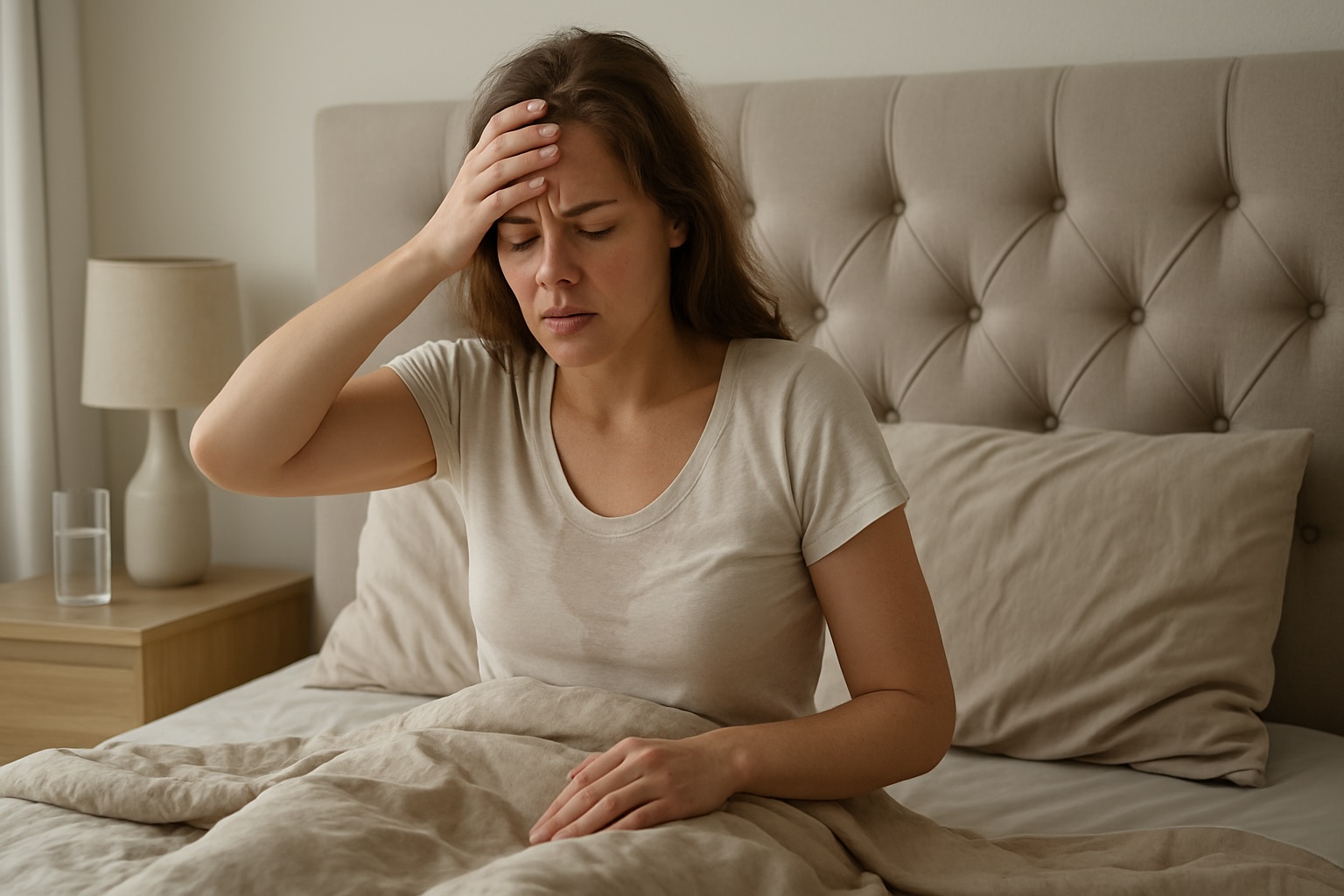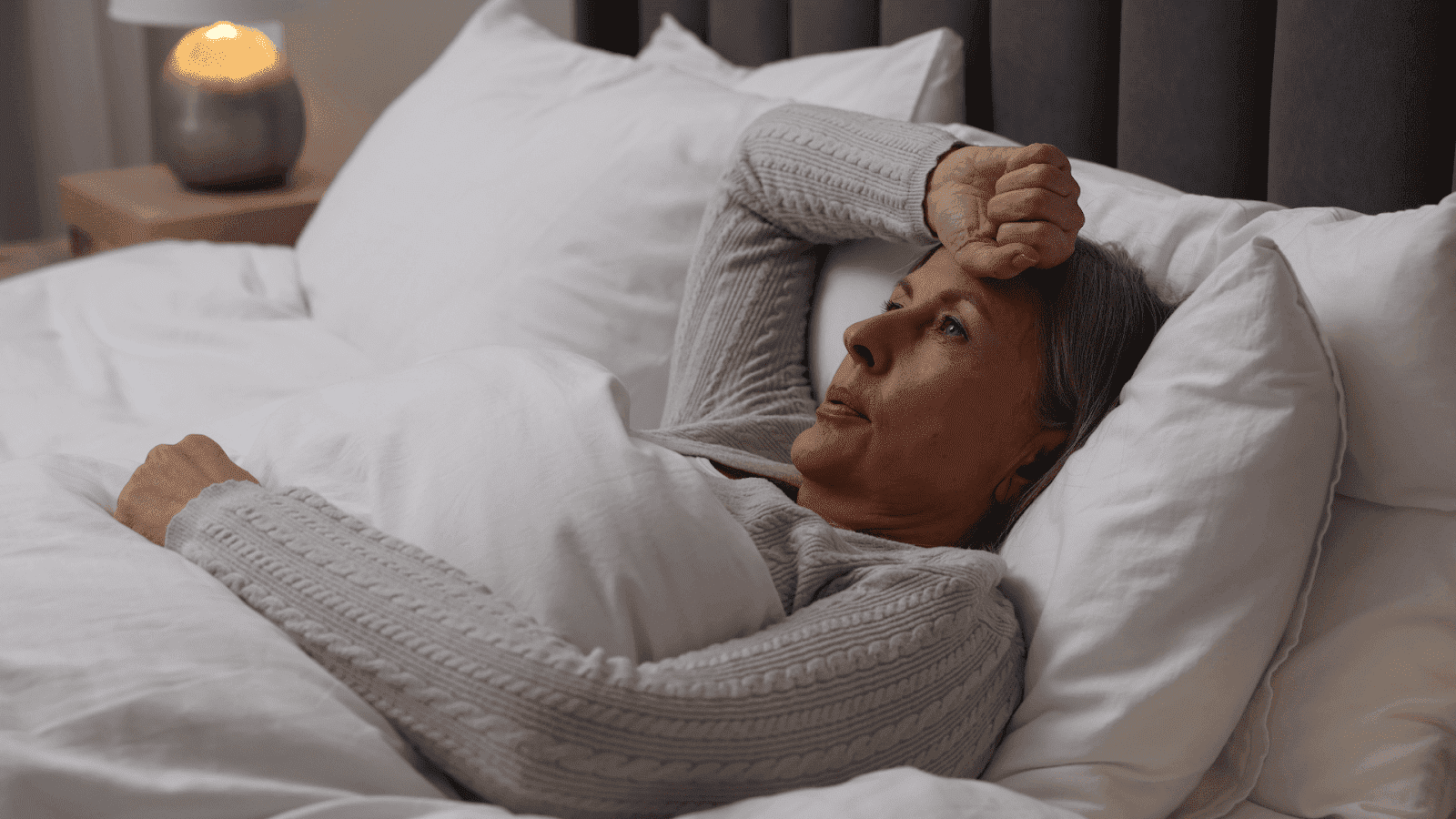Waking up drenched in sweat can be an unsettling experience. Night sweats, or excessive sweating during sleep, affect millions of people worldwide and can disrupt rest, cause discomfort, and sometimes signal underlying health issues. Understanding what night sweats mean, their potential causes, and when to seek medical advice is crucial for maintaining your well-being.
In this article, we’ll explore the common and uncommon reasons behind night sweats, how they relate to your overall health, and what steps you can take to address them. Plus, discover how modern telehealth services like Doctronic.ai are revolutionizing access to personalized medical care for symptoms like night sweats.
 What Are Night Sweats?
What Are Night Sweats?
Night sweats are episodes of excessive sweating that occur during sleep. Unlike normal sweating, which helps regulate body temperature, night sweats are often intense enough to soak through pajamas and bedding. They can leave you feeling chilled or uncomfortable upon waking.
While occasional sweating at night can be caused by environmental factors such as a warm room or heavy blankets, frequent or severe night sweats may indicate an underlying medical condition. Understanding the difference is key to knowing when to seek help. Various factors can contribute to night sweats, including hormonal changes, infections, and even certain types of cancer. For instance, individuals undergoing hormonal fluctuations, such as those experiencing menopause, may find themselves particularly susceptible to these unsettling episodes. Additionally, some infections, like tuberculosis or HIV, can lead to night sweats as the body fights off illness.
How Common Are Night Sweats?
Night sweats are a widespread complaint. Studies suggest that up to 41% of adults experience night sweats at some point in their lives. The prevalence increases with age and can be influenced by factors like menopause, infections, and certain medications.
Given their frequency, night sweats are often dismissed as a minor nuisance. However, persistent night sweats warrant attention, especially if accompanied by other symptoms such as unexplained weight loss, fever, or fatigue. It is also important to note that lifestyle factors, such as stress and anxiety, can exacerbate the occurrence of night sweats. Individuals experiencing high levels of stress may find that their bodies react with increased sweating during sleep as a response to heightened anxiety levels. Furthermore, certain medications, particularly antidepressants and hormone therapies, can also trigger night sweats, making it essential for individuals to discuss their symptoms with healthcare providers to identify potential causes and appropriate treatments.
Common Causes of Night Sweats
Night sweats can stem from a variety of causes, ranging from benign to serious. Identifying the root cause is essential for effective treatment.
1. Hormonal Changes
Hormonal fluctuations are among the most common triggers of night sweats. For example, women going through menopause often experience hot flashes and night sweats due to declining estrogen levels. Similarly, hormonal imbalances related to thyroid disorders can provoke excessive sweating at night. In addition to menopause, hormonal changes can also occur during puberty, pregnancy, or even as a result of certain medical conditions like polycystic ovary syndrome (PCOS). These fluctuations can lead to a range of symptoms, including mood swings and sleep disturbances, making it crucial to monitor and manage them effectively.
2. Infections
Certain infections can cause night sweats as the body fights off illness. Tuberculosis is a classic example, but other infections such as HIV, endocarditis (infection of the heart lining), and abscesses can also be culprits. In addition, conditions like bacterial infections and even viral infections such as the flu can lead to night sweats. If night sweats are accompanied by fever, chills, or unexplained weight loss, it’s important to consult a healthcare provider promptly. Early diagnosis and treatment are key to managing infections and preventing complications, particularly in cases where the body’s immune response is severely compromised.
3. Medications
Some medications list night sweats as a side effect. These include antidepressants, steroids, and medications used to lower fever or treat diabetes. If you’ve recently started a new medication and notice night sweats, discuss this with your doctor. Additionally, certain herbal supplements and over-the-counter medications can also contribute to increased sweating at night. It’s essential to keep a detailed record of any new medications or supplements you are taking, as this information can help your healthcare provider determine the best course of action and adjust your treatment plan if necessary.
4. Sleep Disorders
Conditions like obstructive sleep apnea can cause night sweats. Sleep apnea leads to interrupted breathing during sleep, which can trigger the body’s stress response and result in sweating. If night sweats are paired with loud snoring or daytime fatigue, a sleep study might be recommended. Other sleep disorders, such as restless leg syndrome or insomnia, can also contribute to night sweats by disrupting the normal sleep cycle. Addressing these underlying issues can not only help alleviate night sweats but also improve overall sleep quality and daytime alertness.
5. Cancer and Other Serious Conditions
Night sweats can sometimes signal more serious illnesses such as lymphoma or leukemia. These cancers can cause systemic symptoms, including night sweats, unexplained weight loss, and persistent fatigue. While less common, it’s important to rule out these possibilities when night sweats persist without an obvious cause. In addition to cancers, autoimmune disorders like rheumatoid arthritis or infections like endocarditis can also present with night sweats as a symptom. Regular check-ups and being vigilant about any changes in your health can be crucial in catching serious conditions early on, leading to more effective treatment options.
When to See a Doctor About Night Sweats
Not every episode of night sweating requires medical attention. However, certain warning signs should prompt a consultation with a healthcare professional.
Night sweats that are frequent and severe
Associated symptoms such as fever, weight loss, or fatigue
New or worsening symptoms over time
Concerns about medication side effects
If you’re unsure about the cause of your night sweats, Doctronic.ai offers a convenient and affordable way to get expert medical advice from the comfort of your home. Doctronic’s AI-powered doctor visits provide fast, personalized answers based on the latest medical research, helping you understand your symptoms and next steps.
Night sweats can be a perplexing symptom, often leading to sleepless nights and increased anxiety. They can stem from a variety of causes, ranging from hormonal changes, such as those experienced during menopause, to infections or even certain cancers. Understanding the underlying reason for your night sweats is crucial, as it can guide your treatment options and help alleviate any associated discomfort. Keeping a symptom diary can be beneficial; noting when the sweats occur, their intensity, and any accompanying symptoms can provide valuable information for your healthcare provider.
In addition to seeking medical advice, there are lifestyle adjustments that may help manage night sweats. Maintaining a cool sleeping environment, wearing breathable fabrics, and avoiding triggers such as spicy foods or alcohol before bedtime can make a significant difference. Moreover, practicing relaxation techniques like meditation or yoga may help reduce stress levels, which can also contribute to night sweats. By taking proactive steps and staying informed, you can better navigate this challenging symptom and improve your overall sleep quality.
How Doctronic.ai Can Help with Night Sweats
Doctronic.ai is transforming healthcare by combining advanced AI technology with human medical expertise. If you’re waking up sweaty and want to understand what it could mean, Doctronic’s AI doctor can provide a comprehensive evaluation in seconds.
Unlike generic symptom checkers, Doctronic’s AI draws on peer-reviewed medical research and remembers your medical history to offer tailored recommendations. Whether you want to know if your night sweats are related to menopause, an infection, or something more serious, Doctronic can guide you on whether to seek in-person care or try lifestyle adjustments first.
Additionally, Doctronic offers telehealth video visits with licensed doctors 24/7 across all 50 states for under $40. This means you can get a professional diagnosis and treatment plan without leaving your home, saving time and reducing stress.
Tips to Manage Night Sweats at Home
While it’s important to identify and treat any underlying causes, there are practical steps you can take to reduce night sweats and improve sleep quality.
1. Optimize Your Sleep Environment
Keep your bedroom cool and well-ventilated. Use breathable, moisture-wicking bedding and lightweight pajamas to help regulate body temperature. Avoid heavy blankets or flannel sheets during warmer months.
2. Watch Your Diet and Lifestyle
Avoid spicy foods, caffeine, and alcohol close to bedtime, as these can trigger sweating. Regular exercise can improve overall health, but try to finish workouts at least a few hours before sleep.
3. Manage Stress
Stress and anxiety can exacerbate night sweats. Relaxation techniques such as deep breathing, meditation, or gentle yoga before bed may help calm your nervous system.
4. Track Your Symptoms
Keep a diary of your night sweats, noting when they occur, their severity, and any accompanying symptoms. This information can be invaluable when consulting with healthcare providers, including during telehealth visits with services like Doctronic.ai.
Understanding the Bigger Picture
Night sweats are more than just an uncomfortable nuisance. They can be a window into your overall health, signaling hormonal imbalances, infections, medication effects, or even serious diseases. Early recognition and appropriate evaluation are key to addressing the root cause and improving quality of life.
Thanks to advances in technology, accessing expert medical advice has never been easier. Doctronic.ai provides a unique blend of AI-driven insights and human care, ensuring you get accurate, personalized answers quickly and affordably.
 Night Sweats? Don’t Sleep on It
Night Sweats? Don’t Sleep on It
If you find yourself regularly waking up sweaty, don’t ignore it. While it may be caused by something as simple as your bedroom temperature, persistent night sweats can indicate underlying health issues that deserve attention.
Consider your overall health, any new medications, and other symptoms you may be experiencing. When in doubt, reach out to a trusted healthcare provider. Doctronic.ai makes it easy to get expert guidance without the hassle of traditional doctor visits.
Good sleep is essential for good health. Taking night sweats seriously and seeking timely care can help you rest better and live healthier.
Get Instant, Personalized Care with Doctronic
If night sweats are disrupting your sleep and you're looking for answers, Doctronic is here to help. Our AI-powered platform offers free, immediate doctor visits, providing you with a personalized diagnosis that you can take to any doctor for further treatment. Experience the most modern, peer-reviewed medical advice without waiting for an appointment. For added convenience, our telehealth video visits connect you with licensed doctors 24/7 in all 50 states for less than $40. Join over 10 million people who have already discovered the smarter, more personal healthcare solution. Skip the line. Talk to an AI Doctor Now, for free.Night sweats are episodes of excessive sweating that occur during sleep. Unlike nor



 What Are Night Sweats?
What Are Night Sweats? Night Sweats? Don’t Sleep on It
Night Sweats? Don’t Sleep on It